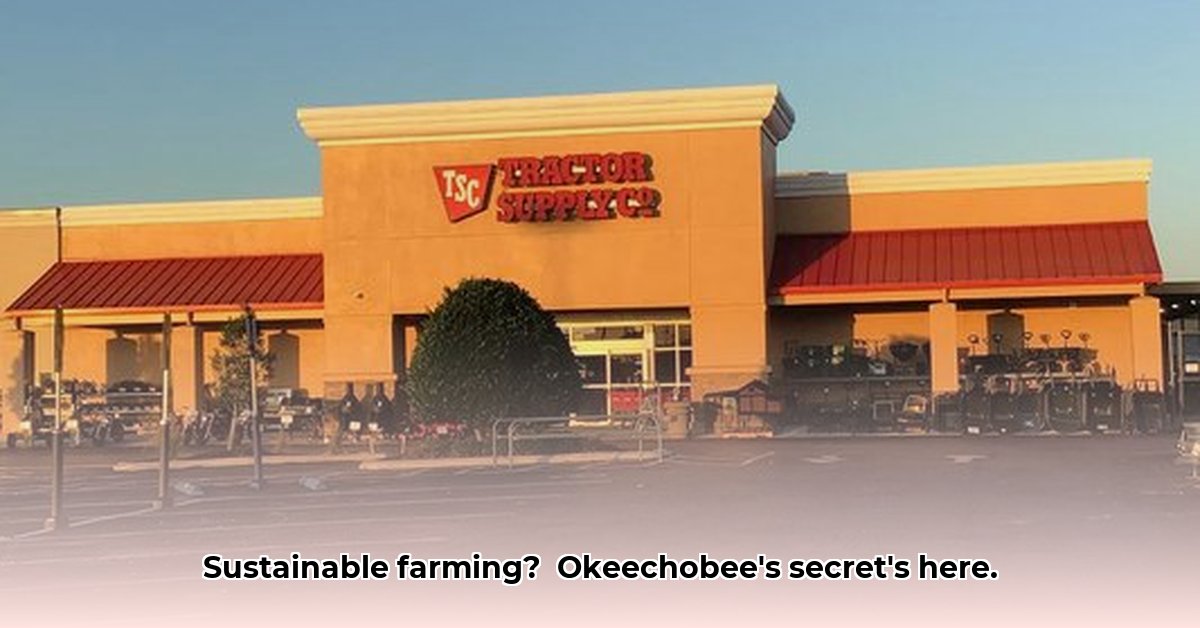
Tractor Supply in Okeechobee, Florida, occupies a pivotal position within the local agricultural landscape. This article examines its role – and potential for a greater role – in supporting sustainable farming practices within the community. We will analyze its current offerings, identify shortcomings in its sustainability efforts, and propose concrete, actionable steps for improvement. For similar initiatives in other locations, see this example: Lynn Haven store.
Tractor Supply's Current Offerings for Sustainable Agriculture
Tractor Supply's Okeechobee location stocks a variety of products relevant to sustainable farming. For livestock operations, they offer a range of high-quality feeds, potentially including options formulated to optimize animal health and minimize waste. Fencing materials, crucial for responsible land management and livestock containment, are also readily available. Furthermore, the store provides a selection of gardening supplies—seeds, tools, and soil amendments—some of which may include organic options. While the specific availability of organic and sustainably sourced products requires further investigation, the potential for supporting sustainable practices through their existing inventory is evident. How many of these products currently meet organic certification standards? This question needs quantitative answering.
Gaps in Sustainability: Transparency and Sourcing Practices
Despite the potential, Tractor Supply's commitment to sustainable agriculture lacks transparency. Crucially, the percentage of their products holding organic certifications remains unclear. Without this data, farmers and environmentally conscious consumers cannot make fully informed purchasing decisions. Similarly, information regarding the sourcing of products and their transportation methods is scarce. Transportation-related greenhouse gas emissions are a major concern, and understanding the complete supply chain is crucial for assessing the true environmental impact. The lack of readily available information on packaging materials (recyclable, compostable, recycled content) further hampers the assessment of their overall sustainability performance. Are there any efforts to reduce packaging waste or source it sustainably? A comprehensive audit seems necessary.
Actionable Steps for a Greener Future: A Phased Approach
To enhance Tractor Supply's contribution to sustainable agriculture in Okeechobee, a multi-phased approach is recommended.
Phase 1: Transparency and Education (0-1 year)
- Product Sourcing Audit: Conduct a thorough review of all product sourcing to identify opportunities to increase the proportion of organically certified and environmentally friendly products, including an analysis of supply chain efficiency, transportation routes, and logistics.
- Life Cycle Assessment: Commission a life cycle assessment (LCA) of selected best-selling products to quantify their environmental footprint, identifying areas for improvement.
- Customer Feedback Mechanism: Implement a system for gathering customer feedback regarding product sustainability, allowing for direct input and improved product selection in line with community needs.
Phase 2: Collaboration and Growth (1-3 years)
- Local Partnerships: Establish partnerships with local organic farms and producers to directly source and stock their products. This supports local businesses, reduces transportation-related emissions, and offers consumers more sustainable choices.
- Dedicated Sustainable Product Section: Create a designated area within the store for sustainable products, clearly labeling them with certifications and highlighting their eco-friendly aspects to increase visibility and consumer awareness.
Phase 3: Long-Term Sustainability (3-5+ years)
- Supply Chain Optimization: Implement strategies to minimize the environmental impact throughout the supply chain, from material sourcing to transportation and packaging. Explore options like carbon offsetting for unavoidable emissions.
- Continuous Improvement: Regularly review and refine sustainability practices, incorporating data from LCAs, customer feedback, and external audits for ongoing progress.
Local Impact and Community Engagement: Building a Sustainable Ecosystem
Local sourcing of products significantly reduces the carbon footprint associated with transportation. However, the most impactful approach involves active community engagement. Tractor Supply should invest in educational workshops and events (e.g., water conservation, composting, pest management) led by local experts, fostering community involvement and knowledge sharing. This approach creates a mutually beneficial relationship among Tractor Supply, local farmers, and the broader Okeechobee community, stimulating adoption of environmentally conscious farming.
Conclusion: A Call to Action
Tractor Supply Okeechobee possesses the potential to become a leader in promoting sustainable practices within the local agricultural ecosystem. By prioritizing transparency, collaborating with local stakeholders, and consistently improving its supply chain, it can significantly enhance its positive impact. This requires a proactive commitment to sustainability, not just through product selection, but through strong community engagement and a commitment to continuous improvement. The future of sustainable agriculture in Okeechobee hinges on the collective efforts of businesses, farmers, and the community.